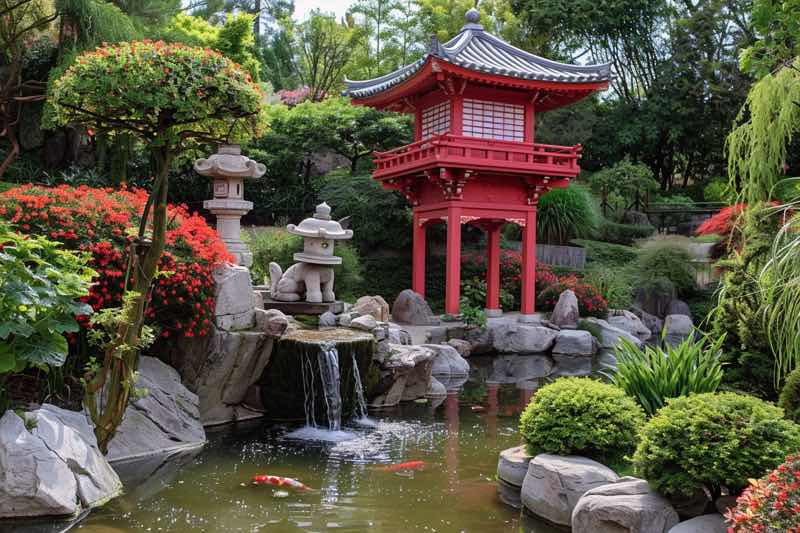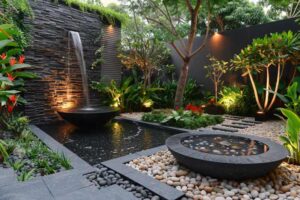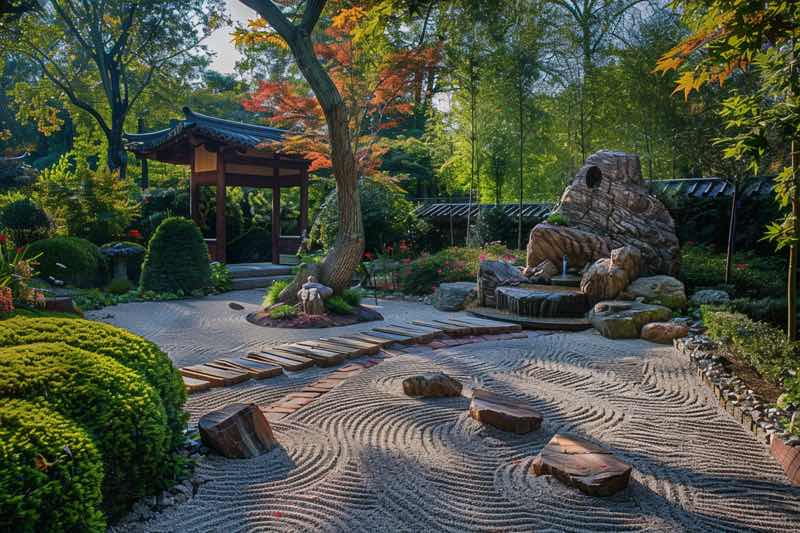Feng Shui Principles in Your Garden Layout

Garden layout in Feng Shui is an important concept in garden design because it can create balance and harmony in the environment. By applying the principles of Feng Shui, you can create a garden that radiates positive energy and provides tranquility for its inhabitants.
Key Takeaways
- It is important to consider natural elements such as plants, water, and rocks in your garden design.
- A harmonious layout can create a good flow of energy in your garden.
- Choosing plants that are in accordance with Feng Shui principles can improve the energy balance in your garden.
Why is Feng Shui Garden Layout Important in Garden Design?

Why Natural Elements Should Be Considered
In the world of garden layouts Feng Shuinatural elements not only act as aesthetic complements, but also have a deeper function in creating balance and harmony. The energy generated by natural elements can affect the atmosphere and well-being of the occupants.
Natural elements in Feng Shui fall into two main categories: hardscape and softscape. Hardscape includes hard elements such as stones, while softscape involves soft elements such as plants.
To apply the Feng Shui principles of effective garden layout, it is important to combine these two types of elements in a harmonious way. Here are some tips:
- Selecting plants that matches the direction and elements of the garden area.
- Using stone as a hardscape element to add texture and depth.
- Added water element such as ponds or fountains to increase the flow of energy.
Integrating natural elements wisely will not only create a beautiful garden, but also a balanced and healthy environment.
How to Organize a Harmonious Garden Layout
Organizing a harmonious garden layout is not just about randomly placing plants and decorations. Energy balance and flow should be a major consideration. In the feng shui of garden layout, every element should be placed with thorough to create harmony and prosperity.
- Water and stone are often used to add a natural element and help channel energy.
- Plants should be selected based on color and size to support visual and energy balance.
- The placement of sculptures or other decorative elements should take into consideration the direction and flow of energy.
It is important to remember that every element in the garden should function together as a harmonious whole.
By paying attention to these aspects, you can create a garden that is not only aesthetically pleasing, but also supports well-being and harmonious living.
Practical Tips for Applying Feng Shui to the Garden

Selection of Suitable Plants
Choosing plants for your garden is not just about aesthetics, but also about how they contribute to the flow of positive energy. Living green plants are considered as carriers of positive energy that can promote health, wealth and well-being. Therefore, plant selection should be done with care and consideration.
Some plants that are considered auspicious according to Feng Shui include bamboo, peonies, and lotus. Each plant has unique symbolism and energy benefits. For example, bamboo symbolizes resilience and good luck, while peonies are associated with prosperity and beauty.
To create a harmonious and balanced garden, consider incorporating different types of plants that support different aspects of life.
Here is a list of recommended plants for your garden based on Feng Shui principles:
- Bamboo: Resilience and luck
- Peony: Prosperity and beauty
- Lotus: Enlightenment and purity
- Rose: Love and passion
It is important to remember that plant placement also plays a key role in creating a balanced garden. The selected plants should be placed in the appropriate areas of the garden according to the Bagua your garden to maximize the flow of positive energy.
Use of Stone and Water for Balance
Applying Feng Shui principles to the garden is not only about plant selection, but also about how we integrate other natural elements such as rocks and water to create balance. The use of stone and water can increase Chi energy within the garden, which is essential for bringing harmony and well-being.
Using stones in the garden can be in the form of arranging stones as pathways or as decorative elements that accentuate natural beauty. Meanwhile, water, which is a symbol of wealth and prosperity in the garden, can be used as a decorative element. Feng ShuiIt can be realized in the form of a pond or fountain.
It is important to pay attention to the position and shape of these elements to match the Feng Shui principles.
Here are some tips for integrating stone and water in your garden:
- Make sure that the water flows towards the inside of the garden, not away from the house, to attract positive energy.
- Use boulders as 'guards' at the garden entrance to add protection and strength.
- Vary the size and shape of the stones to add texture and visual depth to the garden.
- Consider adding fish to the pond, because koi fish especially believed to bring good luck and prosperity.
Conclusion
By applying garden layout Feng Shui principles in your garden layout design, you can create a harmonious and balanced environment. By paying attention to direction, elements, and flowing energy, your garden can become a calming and refreshing place for you and your family.
So, don't hesitate to apply these Feng Shui principles in designing your dream garden! Contact us now to get a good Feng Shui garden layout.
FAQs
Does Feng Shui really matter in garden design?
Yes, Feng Shui plays an important role in creating harmony and energy balance in the garden.
How to determine which plants are in accordance with Feng Shui principles?
You can choose plants that have elements that correspond to certain directions and positions in the garden according to Feng Shui principles.
Can the use of water and stones really create balance in the garden?
Yes, the use of water and stones can help create a harmonious energy flow and balance in accordance with Feng Shui principles.

